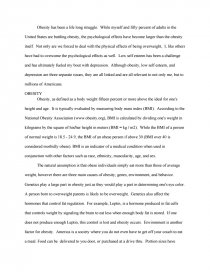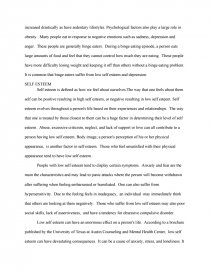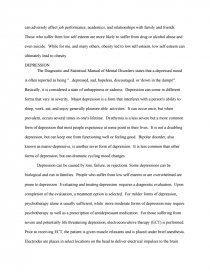Obesity, Self Esteem, & Depression
Essay by review • December 18, 2010 • Essay • 1,224 Words (5 Pages) • 2,638 Views
Obesity has been a life long struggle. While myself and fifty percent of adults in the United States are battling obesity, the psychological effects have become larger than the obesity itself. Not only are we forced to deal with the physical effects of being overweight, I, like others have had to overcome the psychological effects as well. Low self esteem has been a challenge and has ultimately fueled my bout with depression. Although obesity, low self esteem, and depression are three separate issues, they are all linked and are all relevant to not only me, but to millions of Americans.
OBESITY
Obesity, as defined as a body weight fifteen percent or more above the ideal for one's height and age. It is typically evaluated by measuring body mass index (BMI). According to the National Obesity Association (www.obesity.org), BMI is calculated by dividing one's weight in kilograms by the square of his/her height in meters (BMI = kg / m2). While the BMI of a person of normal weight is 18.5 - 24.9, the BMI of an obese person if above 30 (BMI over 40 is considered morbidly obese). BMI is an indicator of a medical condition when used in conjunction with other factors such as race, ethnicity, muscularity, age, and sex.
The natural assumption is that obese individuals simply eat more than those of average weight, however there are three main causes of obesity; genes, environment, and behavior. Genetics play a large part in obesity just as they would play a part in determining one's eye color. A person born to overweight parents is likely to be overweight. Genetics also affect the hormones that control fat regulation. For example, Leptin, is a hormone produced in fat cells that controls weight by signaling the brain to eat less when enough body fat is stored. If one does not produce enough Leptin, this control is lost and obesity occurs. Environment is another factor for obesity. America is a society where you do not even have to get off your couch to eat a meal. Food can be delivered to you door, or purchased at a drive thru. Portion sizes have increased drastically as have sedentary lifestyles. Psychological factors also play a large role in obesity. Many people eat in response to negative emotions such as sadness, depression and anger. These people are generally binge eaters. During a binge eating episode, a person eats large amounts of food and feel that they cannot control how much they are eating. These people have more difficulty losing weight and keeping it off than others without a binge eating problem. It is common that binge eaters suffer from low self esteem and depression.
SELF ESTEEM
Self esteem is defined as how we feel about ourselves.The way that one feels about them self can be positive resulting in high self esteem, or negative resulting in low self esteem. Self esteem evolves throughout a person's life based on their experiences and relationships. The way that one is treated by those closest to them can be a huge factor in determining their level of self esteem. Abuse, excessive criticism, neglect, and lack of support or love can all contribute to a person having low self esteem. Body image, a person's perception of his or her physical appearance, is another factor in self esteem. Those who feel unsatisfied with their physical appearance tend to have low self esteem.
People with low self esteem tend to display certain symptoms. Anxiety and fear are the main the characteristics and may lead to panic attacks where the person will become withdrawn after suffering when feeling embarrassed or humiliated. One can also suffer from hypersensitivity. Due to the feeling feels in inadequacy, an individual may immediately think that others are looking at them negatively. Those who suffer from low self esteem may also poor social skills, lack of assertiveness, and have a tendency for obsessive compulsive disorder.
Low self esteem can have an enormous effect on a person's life. According to a brochure published by the University of Texas at Austin Counseling and Mental Health Center, low self esteem can have devastating consequences. It can be a cause of anxiety, stress, and loneliness. It can adversely affect job performance, academics, and relationships
...
...



